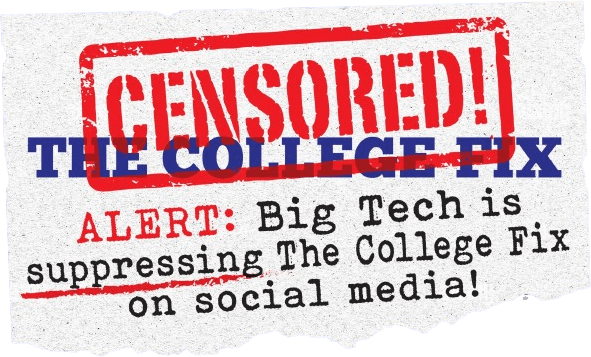Purdue and Ball State universities, nestled roughly 100 miles apart in central Indiana, have both become ground zero for the two biggest higher education controversies of the summer.
Despite their close proximity, the reasons they gained the national spotlight are polar opposites: one campus defended academic freedom, the other clamped down hard on it.
Thus Purdue and Ball State have become an interesting and revelatory case study – a microcosm – of the double standards and hypocrisy that run rampant at universities today.
In the case of Purdue University, a few weeks ago the Associated Press reported on an email exchange from 2010 between then Indiana Gov. Mitch Daniels and members of his administration. In the exchange, Daniels – currently Purdue’s president – called for the “disqualification” of late historian Howard Zinn’s A People’s History of the United States from use in state K-12 classrooms.
“It is a truly execrable, anti-factual piece of disinformation that misstates American history on every page,” Daniels wrote. “Can someone assure me that it is not in use anywhere in Indiana? If it is, how do we get rid of it before any more young people are force-fed a totally false version of our history?”
In doing so, Daniels joined a long list of scholars, historians and academics from the left and the right who saw in Zinn’s work anything but historicity.
Yet today, Daniels faces calls to resign, and also stands accused of censorship and violations of academic freedom from more than ninety professors at Purdue.
In contrast, let’s take a two-hour car ride over to Muncie, Indiana, where Ball State’s Professor Eric Hedin taught the popular “Boundaries of Science” course. In the course, Hedin—a well-liked professor of unquestionable scientific competency (just check out his CV) —had the audacity to give voice to his professional opinion that the natural structure of the universe does not exclude belief in God’s creative activity.
In doing so, Hedin joined many contemporary astrophysicists and cosmologists — including a former manager of NASA’s educational programs in the nation’s capital, who stated publicly he sees the hand of an intelligent creator in the physical makeup of the universe.
These modern men and women of science, many with degrees from some of the most respected universities across the globe, used rigorous scientific methods coupled with the latest technology and research – not a belief in a religion – to come to their conclusions that an intelligence can be discerned in everything from the origins of the universe to the cellular level of life on Earth.
Hedin also joined the echelon of enormously celebrated men of science who have historically done the same: Bacon, Newton, Leibniz, Copernicus, Galileo, Mendel, Faraday, Pasteur, Aristotle, Pascal and countless others, including Charles Darwin himself, who once said a person “can be an ardent theist and an evolutionist.”
But Hedin’s critics demanded his science class be banned, that he keep “religious” views out of the classroom. They were successful.
In her recent announcement explaining why the notion of intelligent design will not be tolerated in a science class, Ball State president Jo Ann Gora stated “intelligent design is overwhelmingly deemed by the scientific community as a religious belief and not a scientific theory.”
Gora also added her decision was a matter of academic integrity, not academic freedom.
However, the point of academic freedom is to ensure that even unpopular or minority opinions are given a place in a community of inquiry and research. Isn’t that why those 92 professors over at Purdue clamored to defend Zinn, writing a letter to Daniels which stated “the very viability of academic inquiry and the university’s mission is at stake.”
All this to defend Zinn, a self-described propagandist who openly sought to persuade young minds to resent and consider evil the foundations of this country. It’s not a stretch to say Zinn was almost religious in his zeal for such aims.
Ultimately, if the point of academic integrity is to disqualify as unfit-to-teach any unpopular or minority opinions, and to accept as legitimate only those views espoused by the majority, then it’s a zero-sum game. Suddenly, the same viewpoints protected by academic freedom are squashed by academic integrity and rejected as being unprofessional or incompetent.
A bat can see the problem here. A double standard exists in academia, a secular realm in which free expression and open exchange are valued insofar as those ideas and values confirm with the majority’s secular opinion. Sounds like an education in tyranny to me: an education that marginalizes at every turn any academic perspective that admits religious belief or doctrine.
When faced with outcries by proponents of academic freedom over the Hedin decision, Gora countered critics with an appeal to academic integrity. When Daniels added his voice to the bipartisan choir that had denounced Zinn’s book as simply inaccurate and unfit-to-be-taught, he was angrily cascaded by proponents of “academic freedom.”
The same folks who wanted Hedin’s class removed in the name of academic integrity want Daniels to resign his post in the name of academic freedom. Dizzy yet?
There are few, if any, standards that the godless academy won’t obliterate in its mission to have its way, laid bare recently thanks to the intense focus on these Hoosier institutions of higher learning.
Fix contributor Michael Bradley is a student at the University of Notre Dame.
IMAGE: Citizen Sheep
Click here to Like The College Fix on Facebook / Twitter: @CollegeFix

